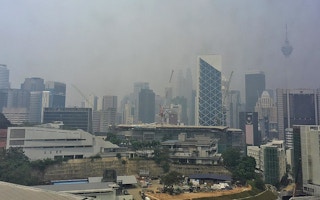Indonesia’s president has admitted negligence on the part of the government, as top officials engage in a blame game amid the worst spate of forest fires since 2015 that’s sending clouds of toxic haze across large swaths of the country and abroad.
This year’s fires, most of them set deliberately to clear land for planting, have burned nearly 340,000 hectares (840,000 acres) as of August 31—an area a third the size of Jamaica—according to data from the environment ministry.
“Ahead of the dry season, everyone should have been prepared,” President Joko Widodo said on September 17 during a meeting with officials in Sumatra’s Riau province, one of the worst-affected regions.
“But we’ve been negligent again [this year], so the haze has become big,” he added.
He reminded the officials that during a meeting in Jakarta in July, he had emphasised the importance of preventive measures to stop the fires spreading out of control. “Because if there are already fires, especially on peatland, then it’s very hard to extinguish [them], based on our experiences in past years,” he said.
“
Threatening public officials during forest fires is a waste of time.
Teguh Surya, director,Yayasan Madani Berkelanjutan
Widodo also lamented the failure of the relevant state institutions, including the police and the military, to respond quickly enough to the fires.
“We have it all, but these instruments aren’t activated well,” he said. “If they’re activated well, then I’m sure a single fire hotspot will be detected first before it grows into hundreds of fire hotspots. And I’ve reminded that numerous times. What we’re dealing with here isn’t forest [fires], but peatland, which if it’s already burned, then no matter how many million liters [of water] we expend, it’s still difficult to extinguish.”
The president’s remarks come after several of his top aides issued a series of widely ridiculed claims about the fires, haze, and their cause. Siti Nurbaya Bakar, the environment minister, was criticised last week for denying that the fires in Indonesia were sending haze to Malaysia and Singapore, despite overwhelming evidence to the contrary.
She has since doubled down on her position, pointing out that five Singapore- and Malaysia-affiliated companies have had their concessions sealed off because fires had been set there. Thirty-seven other concessions, held by Indonesian companies, have been similarly censured.
Meanwhile, the president’s chief of staff, Moeldoko, called on people affected by the haze to be patient and pray, blaming the disaster squarely on “God.” The country’s chief security minister, Wiranto, had a different take, blaming smallholders for setting the fires. He then also claimed that there was a political angle to the arson, linking the burning to the elections that took place in April.
Fixing the mistakes
In light of these claims, environmental activists have welcomed the president’s acknowledgement of the government’s lack of preparedness to deal with the fires. But just admitting it isn’t enough, said Khalisah Khalid, head of politics at the Indonesian Forum for the Environment (Walhi), the country’s biggest green NGO.
“What about fixing these mistakes?” she told Mongabay. “If [the president] is really angry, then he should evaluate all ministries, government institutions and local governments. He has to do a comprehensive evaluation to find out where the bottleneck is. What’s preventing [forest fire mitigation from being effective]?”
Teguh Surya, the director of Yayasan Madani Berkelanjutan, another environmental NGO, said the president should reflect on his own actions — or the lack thereof — if he really wanted to tackle the annual disaster.
Activists and experts have long identified the problems hindering the government’s efforts at preventing forest fires. These include ineffective enforcement of fines for companies found guilty in court of setting fires; lack of coordination between government agencies responsible for various aspects of fire prevention and mitigation; and lack of transparency over a government program to restore degraded peatland across the country.
Bambang Hero Saharjo, the Indonesian government’s chief expert witness in its prosecutions of companies found setting fires on their concessions, said one of the problems was that local governments were not serious about tackling forest fires, given the lack of funding allocated for the issue. Each district government often only allocates around $2,000 a year to fight forest fires, he said.
“Many district and provincial governments do almost nothing because there’s almost no funding to mitigate fires,” Bambang, an expert in fire forensics from the Bogor Institute of Agriculture (IPB), said as quoted by Kompas daily.
Despite these well-documented problems, Widodo has not responded to activists’ pleas to address these shortcomings, Teguh told Mongabay.
“It’s funny because Pak Jokowi knows that the key is to prevent [forest fires],” Teguh said, referring to the president by his nickname. “But why he doesn’t take leadership in making sure that the target to restore degraded peatland is achieved?”
He added that it would be better for the president to address these problems instead of being seen to lash out at his subordinates every year when the fires inevitably grow out of control.
“Threatening public officials during forest fires is a waste of time,” Teguh said. “If he wants to give an ultimatum, then do it before the forest fires, so that fire prevention truly happens.”
This story was published with permission from Mongabay.com. Read the full story.










